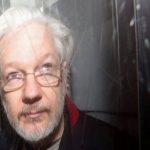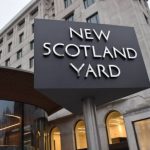Lawyers for the United States have urged a London court to block a last-ditch bid by WikiLeaks founder Julian Assange to appeal his extradition from the United Kingdom to face espionage charges.
On the second and final day of a hearing at London’s High Court on Wednesday, lawyers representing the US said Assange is being prosecuted for publishing sources’ names and not for his political opinions.
The US is seeking to put Assange on trial for WikiLeaks’ release of vast troves of confidential US military records and diplomatic cables.
Assange’s supporters, however, hailed him as a hero who is being persecuted for exposing US wrongdoing, while rights groups are concerned that his prosecution could curb press freedom more broadly.
Assange’s lawyers told the court the case was politically motivated, arguing their client was targeted for his exposure of “state-level crimes” and that Donald Trump had requested “detailed options” on how to kill him.
But, on Wednesday, lawyers for the US said Assange’s prosecution was “based on the rule of law and evidence”.
Assange himself was again not in court on Wednesday nor watching remotely because he was unwell, according to reports.
Assange, 52, has been indicted in the US on 17 charges of espionage and one charge of computer misuse over WikiLeaks’ publication of classified US documents some 15 years ago.
The UK government approved Assange’s extradition to the US in June 2022, after a judge initially blocked it.
The extradition hearings began in the UK in February 2020 and were due to resume in May of the same year, but were then delayed amid the COVID-19 pandemic.
The High Court in London is now determining whether Assange will have further opportunities to argue his case before a UK court, or whether he has exhausted all appeals in the country and must therefore enter the process of extradition.
Lawyers for the United States have urged a London court to block a last-ditch bid by WikiLeaks founder Julian Assange to appeal his extradition from the United Kingdom to face espionage charges.
On the second and final day of a hearing at London’s High Court on Wednesday, lawyers representing the US said Assange is being prosecuted for publishing sources’ names and not for his political opinions.
The US is seeking to put Assange on trial for WikiLeaks’ release of vast troves of confidential US military records and diplomatic cables.
Assange’s supporters, however, hailed him as a hero who is being persecuted for exposing US wrongdoing, while rights groups are concerned that his prosecution could curb press freedom more broadly.
Assange’s lawyers told the court the case was politically motivated, arguing their client was targeted for his exposure of “state-level crimes” and that Donald Trump had requested “detailed options” on how to kill him.
But, on Wednesday, lawyers for the US said Assange’s prosecution was “based on the rule of law and evidence”.
Assange himself was again not in court on Wednesday nor watching remotely because he was unwell, according to reports.
Assange, 52, has been indicted in the US on 17 charges of espionage and one charge of computer misuse over WikiLeaks’ publication of classified US documents some 15 years ago.
The UK government approved Assange’s extradition to the US in June 2022, after a judge initially blocked it.
The extradition hearings began in the UK in February 2020 and were due to resume in May of the same year, but were then delayed amid the COVID-19 pandemic.
The High Court in London is now determining whether Assange will have further opportunities to argue his case before a UK court, or whether he has exhausted all appeals in the country and must therefore enter the process of extradition.
Lawyers for the United States have urged a London court to block a last-ditch bid by WikiLeaks founder Julian Assange to appeal his extradition from the United Kingdom to face espionage charges.
On the second and final day of a hearing at London’s High Court on Wednesday, lawyers representing the US said Assange is being prosecuted for publishing sources’ names and not for his political opinions.
The US is seeking to put Assange on trial for WikiLeaks’ release of vast troves of confidential US military records and diplomatic cables.
Assange’s supporters, however, hailed him as a hero who is being persecuted for exposing US wrongdoing, while rights groups are concerned that his prosecution could curb press freedom more broadly.
Assange’s lawyers told the court the case was politically motivated, arguing their client was targeted for his exposure of “state-level crimes” and that Donald Trump had requested “detailed options” on how to kill him.
But, on Wednesday, lawyers for the US said Assange’s prosecution was “based on the rule of law and evidence”.
Assange himself was again not in court on Wednesday nor watching remotely because he was unwell, according to reports.
Assange, 52, has been indicted in the US on 17 charges of espionage and one charge of computer misuse over WikiLeaks’ publication of classified US documents some 15 years ago.
The UK government approved Assange’s extradition to the US in June 2022, after a judge initially blocked it.
The extradition hearings began in the UK in February 2020 and were due to resume in May of the same year, but were then delayed amid the COVID-19 pandemic.
The High Court in London is now determining whether Assange will have further opportunities to argue his case before a UK court, or whether he has exhausted all appeals in the country and must therefore enter the process of extradition.
Lawyers for the United States have urged a London court to block a last-ditch bid by WikiLeaks founder Julian Assange to appeal his extradition from the United Kingdom to face espionage charges.
On the second and final day of a hearing at London’s High Court on Wednesday, lawyers representing the US said Assange is being prosecuted for publishing sources’ names and not for his political opinions.
The US is seeking to put Assange on trial for WikiLeaks’ release of vast troves of confidential US military records and diplomatic cables.
Assange’s supporters, however, hailed him as a hero who is being persecuted for exposing US wrongdoing, while rights groups are concerned that his prosecution could curb press freedom more broadly.
Assange’s lawyers told the court the case was politically motivated, arguing their client was targeted for his exposure of “state-level crimes” and that Donald Trump had requested “detailed options” on how to kill him.
But, on Wednesday, lawyers for the US said Assange’s prosecution was “based on the rule of law and evidence”.
Assange himself was again not in court on Wednesday nor watching remotely because he was unwell, according to reports.
Assange, 52, has been indicted in the US on 17 charges of espionage and one charge of computer misuse over WikiLeaks’ publication of classified US documents some 15 years ago.
The UK government approved Assange’s extradition to the US in June 2022, after a judge initially blocked it.
The extradition hearings began in the UK in February 2020 and were due to resume in May of the same year, but were then delayed amid the COVID-19 pandemic.
The High Court in London is now determining whether Assange will have further opportunities to argue his case before a UK court, or whether he has exhausted all appeals in the country and must therefore enter the process of extradition.
Lawyers for the United States have urged a London court to block a last-ditch bid by WikiLeaks founder Julian Assange to appeal his extradition from the United Kingdom to face espionage charges.
On the second and final day of a hearing at London’s High Court on Wednesday, lawyers representing the US said Assange is being prosecuted for publishing sources’ names and not for his political opinions.
The US is seeking to put Assange on trial for WikiLeaks’ release of vast troves of confidential US military records and diplomatic cables.
Assange’s supporters, however, hailed him as a hero who is being persecuted for exposing US wrongdoing, while rights groups are concerned that his prosecution could curb press freedom more broadly.
Assange’s lawyers told the court the case was politically motivated, arguing their client was targeted for his exposure of “state-level crimes” and that Donald Trump had requested “detailed options” on how to kill him.
But, on Wednesday, lawyers for the US said Assange’s prosecution was “based on the rule of law and evidence”.
Assange himself was again not in court on Wednesday nor watching remotely because he was unwell, according to reports.
Assange, 52, has been indicted in the US on 17 charges of espionage and one charge of computer misuse over WikiLeaks’ publication of classified US documents some 15 years ago.
The UK government approved Assange’s extradition to the US in June 2022, after a judge initially blocked it.
The extradition hearings began in the UK in February 2020 and were due to resume in May of the same year, but were then delayed amid the COVID-19 pandemic.
The High Court in London is now determining whether Assange will have further opportunities to argue his case before a UK court, or whether he has exhausted all appeals in the country and must therefore enter the process of extradition.
Lawyers for the United States have urged a London court to block a last-ditch bid by WikiLeaks founder Julian Assange to appeal his extradition from the United Kingdom to face espionage charges.
On the second and final day of a hearing at London’s High Court on Wednesday, lawyers representing the US said Assange is being prosecuted for publishing sources’ names and not for his political opinions.
The US is seeking to put Assange on trial for WikiLeaks’ release of vast troves of confidential US military records and diplomatic cables.
Assange’s supporters, however, hailed him as a hero who is being persecuted for exposing US wrongdoing, while rights groups are concerned that his prosecution could curb press freedom more broadly.
Assange’s lawyers told the court the case was politically motivated, arguing their client was targeted for his exposure of “state-level crimes” and that Donald Trump had requested “detailed options” on how to kill him.
But, on Wednesday, lawyers for the US said Assange’s prosecution was “based on the rule of law and evidence”.
Assange himself was again not in court on Wednesday nor watching remotely because he was unwell, according to reports.
Assange, 52, has been indicted in the US on 17 charges of espionage and one charge of computer misuse over WikiLeaks’ publication of classified US documents some 15 years ago.
The UK government approved Assange’s extradition to the US in June 2022, after a judge initially blocked it.
The extradition hearings began in the UK in February 2020 and were due to resume in May of the same year, but were then delayed amid the COVID-19 pandemic.
The High Court in London is now determining whether Assange will have further opportunities to argue his case before a UK court, or whether he has exhausted all appeals in the country and must therefore enter the process of extradition.
Lawyers for the United States have urged a London court to block a last-ditch bid by WikiLeaks founder Julian Assange to appeal his extradition from the United Kingdom to face espionage charges.
On the second and final day of a hearing at London’s High Court on Wednesday, lawyers representing the US said Assange is being prosecuted for publishing sources’ names and not for his political opinions.
The US is seeking to put Assange on trial for WikiLeaks’ release of vast troves of confidential US military records and diplomatic cables.
Assange’s supporters, however, hailed him as a hero who is being persecuted for exposing US wrongdoing, while rights groups are concerned that his prosecution could curb press freedom more broadly.
Assange’s lawyers told the court the case was politically motivated, arguing their client was targeted for his exposure of “state-level crimes” and that Donald Trump had requested “detailed options” on how to kill him.
But, on Wednesday, lawyers for the US said Assange’s prosecution was “based on the rule of law and evidence”.
Assange himself was again not in court on Wednesday nor watching remotely because he was unwell, according to reports.
Assange, 52, has been indicted in the US on 17 charges of espionage and one charge of computer misuse over WikiLeaks’ publication of classified US documents some 15 years ago.
The UK government approved Assange’s extradition to the US in June 2022, after a judge initially blocked it.
The extradition hearings began in the UK in February 2020 and were due to resume in May of the same year, but were then delayed amid the COVID-19 pandemic.
The High Court in London is now determining whether Assange will have further opportunities to argue his case before a UK court, or whether he has exhausted all appeals in the country and must therefore enter the process of extradition.
Lawyers for the United States have urged a London court to block a last-ditch bid by WikiLeaks founder Julian Assange to appeal his extradition from the United Kingdom to face espionage charges.
On the second and final day of a hearing at London’s High Court on Wednesday, lawyers representing the US said Assange is being prosecuted for publishing sources’ names and not for his political opinions.
The US is seeking to put Assange on trial for WikiLeaks’ release of vast troves of confidential US military records and diplomatic cables.
Assange’s supporters, however, hailed him as a hero who is being persecuted for exposing US wrongdoing, while rights groups are concerned that his prosecution could curb press freedom more broadly.
Assange’s lawyers told the court the case was politically motivated, arguing their client was targeted for his exposure of “state-level crimes” and that Donald Trump had requested “detailed options” on how to kill him.
But, on Wednesday, lawyers for the US said Assange’s prosecution was “based on the rule of law and evidence”.
Assange himself was again not in court on Wednesday nor watching remotely because he was unwell, according to reports.
Assange, 52, has been indicted in the US on 17 charges of espionage and one charge of computer misuse over WikiLeaks’ publication of classified US documents some 15 years ago.
The UK government approved Assange’s extradition to the US in June 2022, after a judge initially blocked it.
The extradition hearings began in the UK in February 2020 and were due to resume in May of the same year, but were then delayed amid the COVID-19 pandemic.
The High Court in London is now determining whether Assange will have further opportunities to argue his case before a UK court, or whether he has exhausted all appeals in the country and must therefore enter the process of extradition.














